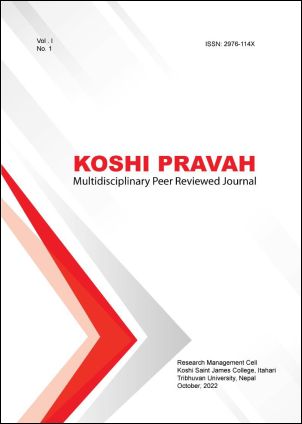Apollonian and Dionysian Forces in William Golding’s Lord of the Flies
DOI:
https://doi.org/10.3126/koshipravah.v1i1.57372Keywords:
Apollonian, Dionysian, transformationAbstract
The objective of this research is to study evil nature of men which is portrayed through the British school children in Golding’s Lord of the Flies. The study further examines how it is important to balance Dionysian and Apollonian drive in order to maintain harmony in the society. Two driving forces of human being are identified by Nietzsche’s terms Apollonian and Dionysian. The two concepts defined by Nietzsche have been used as theoretical tools to analyze the text. Jack ignores Apollonian drive because of his mob mentality. He does not like argument and reason made by Ralph and Piggy. He tries to arouse Dionysian drive in school children in order to collect force against Ralph. Irrational part of Jack’s heart subverts the positive part of British school children’s society. Dionysian drive transforms his heart into emotionless stuff. He kills his own friends. He enjoys gathering boys and misguiding them in the world of illusion. Golding describes the story of a tragic color through the portrayal of the evil in human nature. Two groups of British school going children represent two sides of heart or two parts of the society. The novel argues that proper harmony between two sides or groups leads society to proper direction.




